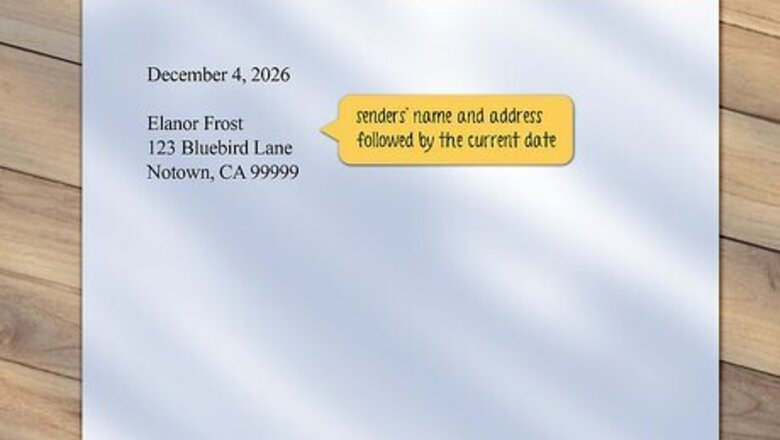
views
Structuring a Retirement Resignation Letter
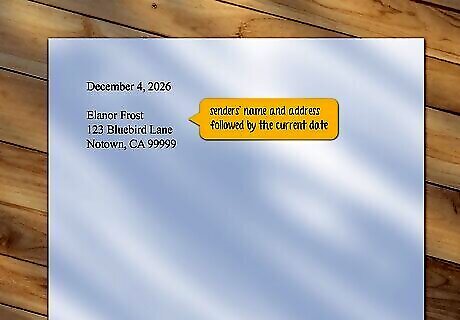
Header Include your name and address followed by the current date in the letter’s heading. Place this information at the top of the page (if you’re using a full-block letter format, type the header on the top left side of the page, or move it to the top right if you're using a modified-block letter format). Hit "Return" so there’s an empty line between your address and the date. The date should be the date you plan on delivering the letter to your supervisor.
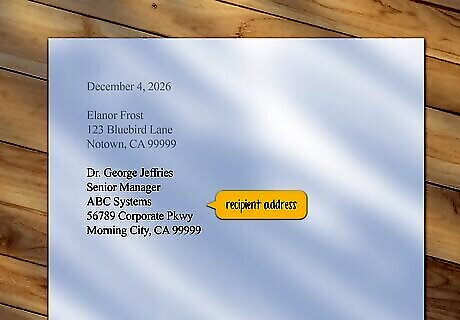
Recipient address Address the letter to your boss (or other appropriate recipient, based on your company's policy) and include their business mailing address. List a specific department if you work for a larger organization. This section is not necessary if you’re sending an email.
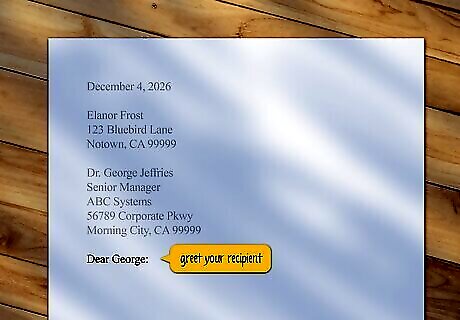
Salutation Greet your recipient with a professional salutation. The most common salutation for a business acquaintance is “Dear.” Since you likely know the recipient personally, it’s acceptable to use their first name as long as that’s how you address them at work. Use your recipient’s professional title and last name if that’s how you refer to them at work. For example, if you work for a veterinarian and call them Dr. Bennett, use that in your salutation. Punctuate your salutation with a colon. For example, use a format like “Dear Dr. Bennett:” for a supervisor with a professional title or “Dear George:” for a more personal salutation.
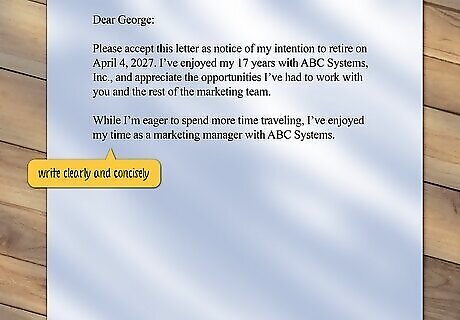
Body The body of your letter will likely include several paragraphs and makes up the bulk of your letter. Write clearly and concisely throughout to maintain a professional tone (you can send more personal sentiments in a card or personal letter, if you prefer). Here is the information you should include: After the salutation, leave a blank line and then clearly state you are retiring from your position at your company with the date of your final day. This is the most important information in the entire letter. For example, “I am writing to inform you that I’m retiring from my role as marketing manager at ABC Agency effective December 5, 2025.” Use additional paragraphs to include some details about your retirement. Briefly mention your immediate retirement plans and express appreciation for the opportunities your employer has given you over the years. Briefly discuss your time with your employer and highlight any of your significant career achievements. If you plan to participate in the transition or training of your replacement, mention it in the body toward the end of the letter.
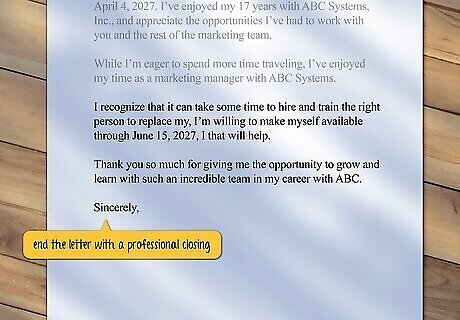
Closing & identification End the letter with a professional closing and identification. Use a phrase like "Sincerely," "Best regards," or "Best wishes" for your closing (also referred to as a complimentary close). Include your name and contact information in the identification. Place your closing phrase two lines below the end of the letter’s body. Capitalize the first letter and follow it with a comma (for example, "Best wishes,"). Include your first and last name and contact information in the identification section. For example, "Best regards, Sarah Johnston, [email protected], 999-999-9999. Leave 4 lines between the closing and identification for your signature.
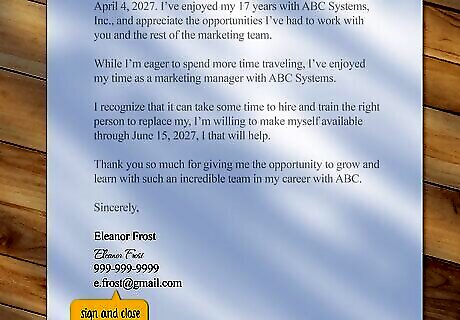
Signature Sign your name in the space between the closing and identification. Use blue or black ink for the most professional look. Use your full first and last names. This is the most professional and formal way to sign a letter.
Sample Retirement Resignation Letters
Example 1December 4, 2026Elanor Frost123 Bluebird LaneNotown, CA 99999Dr. George JeffriesSenior ManagerABC Pharmaceuticals56789 Corporate PkwyMorning City, CA 99999Dear Dr. Jeffries: This letter is to inform you that I intend to retire from my position as Team Lead for ABC Pharmaceuticals. My final work day will be April 4, 2027. I’m excited about moving into the next chapter of my life, but I want to tell you how much I appreciate the many opportunities you created for me at ABC. I’ve enjoyed my time as a Team Lead and will miss working with you and the rest of the team. I want to assure you that I plan to be fully engaged in my work until my retirement date and will do everything in my power to make the transition go as smoothly as possible. I’m happy to help with hiring and onboarding my replacement. Thank you so much for giving me such a wonderful experience at ABC Pharmaceuticals. I’m sure I will look back on the time I spent here fondly. I wish you and the team the best of luck in all of your future endeavors. Please let me know if you need any additional information or if there’s anything I can do to help during the rest of my time here. Best regards, Eleanor [email protected]
Example 2December 4, 2026Elanor Frost123 Bluebird LaneNotown, CA 99999Dr. George JeffriesSenior ManagerABC Systems56789 Corporate PkwyMorning City, CA 99999Dear George: Please accept this letter as notice of my intention to retire on April 4, 2027. I’ve enjoyed my 17 years with ABC Systems, Inc., and appreciate the opportunities I’ve had to work with you and the rest of the marketing team. While I’m eager to spend more time traveling, I’ve enjoyed my time as a marketing manager with ABC Systems. I recognize that it can take some time to hire and train the right person to replace my, I’m willing to make myself available through June 15, 2027, I that will help. Thank you so much for giving me the opportunity to grow and learn with such an incredible team in my career with ABC. Sincerely, Eleanor [email protected]
Example 3December 4, 2026Elanor Frost123 Bluebird LaneNotown, CA 99999George JeffriesManaging EditorABC Publishing56789 Corporate PkwyMorning City, CA 99999Dear Mr. Jeffries:It’s with mixed emotions that I’m writing to formally notify you of my intention to retire from ABC Publishing as Senior Copyeditor.I’ve spent nearly 20 years at ABC, and it’s been such rewarding journey. I’ve loved being able to come to work with such an amazing team to help create imaginative picture books for children. The commitment everyone on the team shows to such important work has made my time here feel less like a job and more like a calling.I want to thank everyone at ABC Publishing for the wonderful memories and exciting opportunities I have enjoyed. I will never forget the times I found out projects I worked on had won important literary awards. There’s no feeling like it.I’m certain these fond memories will follow me into retirement, where they will inspire me to write books my own books for children.Best wishes, Eleanor [email protected]
Tips for Writing Effective Retirement Letters
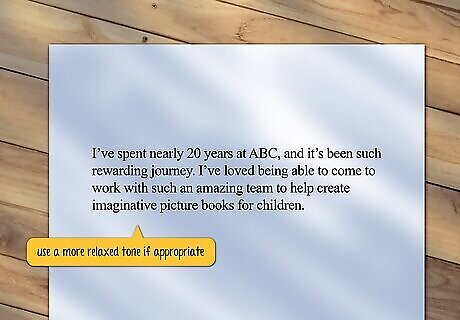
Match your tone to the company culture. Use a slightly more relaxed tone if your employer has a more laid-back culture. If the company culture is more traditional, use a friendly but still formal tone. Life and career coach Shannon O’Brien advises, “Resignation letters are the final impression that you leave, and you want to not burn any bridges and leave on a good note. So keep it positive, keep it brief.” Choose a conservative font style like Arial or Times New Roman to set a more professional tone visually. Use only black fonts in 12pt to make your letter easier to read.
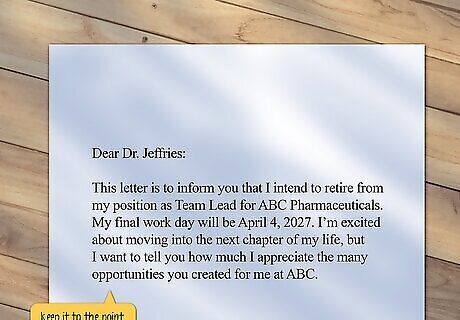
Keep your letter clear and to the point. Focus on relevant details and be careful not to wander off-topic. While a brief mention of your retirement plans is appropriate, avoid giving too many details. A quick overview like, “I’m planning to spend time with family,” or “I will spend some time traveling” is sufficient.
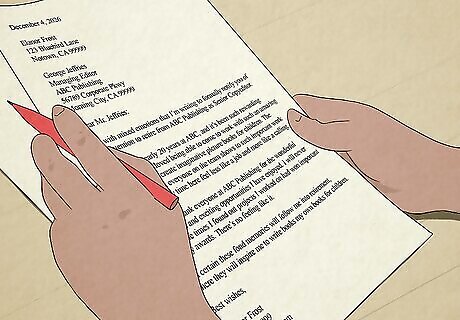
Proofread and edit your letter. Once you’re finished writing your letter, read it over carefully to find any grammatical or spelling errors that can make you appear unprofessional. Remember, this letter is an official notice to the company of your plans for retirement. It will most likely be part of your employment file. Ask a friend or colleague for feedback on your letter to help you find errors you may have missed. They can also offer feedback if you’re unsure of the tone. If you ask a colleague, choose someone you don’t work with. Many employers prefer to be contacted about your retirement plans before you share them with your co-workers.

Deliver the letter to your boss in person. Set a meeting with your supervisor to discuss your retirement plan. Have your retirement resignation prepared in advance so you can give them a copy. Bring a second copy that you or your supervisor can give to the HR department.
Formatting Your Retirement Letter
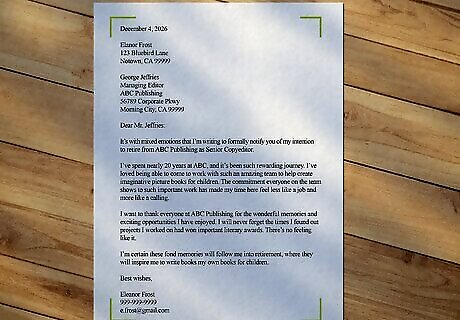
Format your letter using a formal business letter format. Your employer considers your retirement resignation letter to be an official declaration of your impending departure. By formatting and structuring your letter as formal business communication, you demonstrate your courtesy and professionalism. A traditional business letter can be in a full-block or modified-block format. Either one is acceptable for a retirement resignation letter. In a full block format, all of the components are left justified, and the first sentence of each paragraph is not indented. In a modified block format, the heading, closing, signature, and identification are right justified. The address, salutation, body, and enclosures are left justified. The first sentence of each paragraph is indented. Both formats are single-spaced.
Why Should You Write a Formal Retirement Letter?
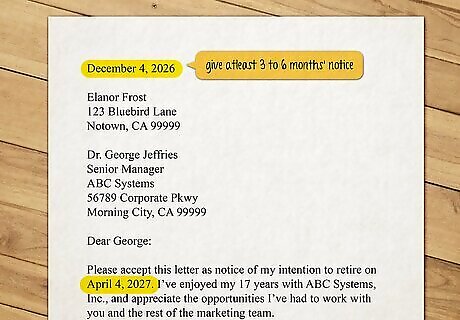
Your retirement resignation letter is a formal notice of your retirement plan. Beyond letting your supervisor know you’re retiring, a formal letter shows respect and courtesy to your employer and gives them a little time to plan for a smooth transition for everyone. Your retirement letter also signals the HR department to start processing your retirement paperwork so there is no delay in receiving your benefits.
How Much Notice Should You Give?

Give your employer from 3 to 6 months' notice. The customary notice for resignation is two weeks. However, in the event of retirement, it’s better to give your employer anywhere from 3 to 6 months lead time. This gives them time to hire a replacement or reassign your responsibilities. A longer notice also gives you time to better adjust to your retirement.
Should You Offer to Train Your Replacement?
Offer to train a replacement if you're comfortable and willing to do so. It’s a good idea to help your employer as much as you can during the transition period, but you don’t have to do anything that makes you uncomfortable. While many employers appreciate any help, some may expect you to stay on or offer assistance indefinitely. Consider offering to be involved with the hiring and onboarding process. If you’re concerned about being permanently on-call, you can communicate a set time you’ll be available for assistance after your final working day. For example, “My last day will be January 25, 2025, but I will be available for assistance through the end of February.”




















Comments
0 comment